A Shift in Menstrual Hygiene Product Accessibility
Menstrual and sanitary disposal products should not be a luxury. In some countries the treatment of feminine hyigne products is changing, Germany and Austria for example have recently reduced the tax on menstrual products such as tampons. In our opinion, feminine hygiene should not be neglected in the commercial sector either. Below we bring to light some current events and trends with mentral hygiene products and what your company or customers can do to improve the workplace and environment.
Country differences – from Scotland to Switzerland
EU legislation stipulates a VAT of at least 5% on hygiene products. Only countries that already had a lower rate before joining the EU can continue to enforce it.
In recent years, a lot has happened around the topic of tampons. At the end of 2019, Germany lowered the tax on menstrual products from 19 to seven percent. Austria was forced to reduce the tax rate on pads and tampons from twenty to ten percent due to a petition signed by over 30,000 people. In Australia, the tax on menstrual products of ten percent was completely removed as of 2019.
An even more prograssive example is Scotland which requires that free feminine hygiene products are provided in the toilets of schools, universities and public institutions. The Scottish Parliament unanimously approved this bill in November 2020. The reason for this is that one in five British people are affected by poverty. When faced with a tight budget, expenditure on menstrual products often takes a back seat.
In Switzerland, too, the menstrual tax may be reduced in the future. Various surveys [1] have shown that more than 50% of Swiss people are in favor of providing menstrual products free of charge in public toilets. The normal rate of value-added tax of 7.7% is charged on sanitary pads and tampons because the products are not considered daily-use items under federal law. In the future, menstrual products could fall under this category and consequently be taxed at a reduced VAT rate of 2.5%.
Environment and Maintenance
Internationally there are many different norms for waste pipe measurements. In Switzerland, drainage pipes are of above aberage size even though a below average amount of waste enters the drainage system. In many countries, considerably more waste enters the sewer system. When this factor is combined with smaller pipes, clogs are inevitable. Feminine hygiene products, amount other items, contribute to this problem. In London, huge mountains of grease have accumulated in the sewers on several occasions. This is caused by consumers using drains as a garbage can for products that should not enter the drainage pipes. This regularly results in high cleaning costs.
Feminine hygiene solutions
In most European countries there are regulations about toilets and washrooms for commercial use. Installation of feminine hygiene disposal systems in public or semi-public bathrooms is recommended and in some countries required. Sanitary disposal bag dispensers and waste bins are available in various designs, combinations and colours. Every ladies’ toilet as well as shared toilets should be equipped with these hygiene solutions. This helps prevent feminine hygiene products from ending up down the drain and in the filter system of the wastewater system and provides a hygienic and discreet way to dispose of femine hygiene products properly.
Discover the new Hygolet feminine hygiene bag dispenser here.
[1] Siehe: SRF https://www.srf.ch/news/international/weltpremiere-in-schottland-sind-binden-und-tampons-kuenftig-gratis


